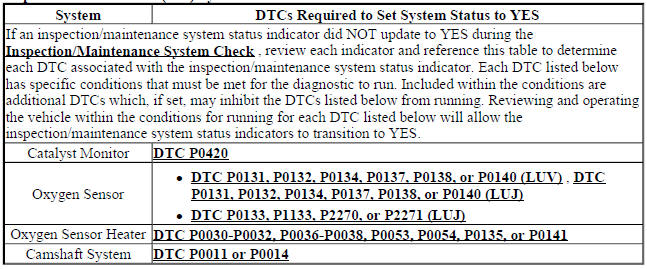Chevrolet Trax: Inspection/maintenance complete system set procedure
Diagnostic Instructions
- Perform the Diagnostic System Check - Vehicle prior to using this diagnostic procedure.
- Review Strategy Based Diagnosis for an overview of the diagnostic approach.
- Diagnostic Procedure Instructions provides an overview of each diagnostic category.
Circuit/System Description
The purpose of the inspection/maintenance complete system set procedure is to satisfy the enable criteria necessary to execute all of the inspection/maintenance readiness diagnostics and complete the trips for those particular diagnostics. When all inspection/maintenance monitored diagnostic tests are completed, the inspection/maintenance system status indicators are set to yes. Perform the inspection/maintenance complete system set procedure if any inspection/maintenance system status indicators are set to NO.
Condition for Meeting a Cold Start
- The ignition voltage between 10-18 V.
- The barometric pressure (BARO) is more than 75 kPa (10.15 PSI).
- The engine coolant temperature (ECT) at start-up is greater than -5ºC (23ºF).
- The intake air temperature (IAT) at start-up is less than 40ºC (104ºF).
- The difference between the start-up IAT and ECT are within 3ºC (5ºF).
- The engine is OFF for greater than 6 h or the following conditions must be met:
- The start-up IAT minus start-up ECT 1 are within 12ºC (22ºF).
- The start-up ECT minus start-up IAT are within 50ºC (90ºF).
- Fuel level is between 25-75%.
Circuit/System Verification
- Verify that all I/M System Status indicators report YES, and that no I/M Test DTCs are present.
- If any I/M Test DTCs are set
Refer to Diagnostic Trouble Code (DTC) List - Vehicle .
- If no I/M Test DTCs are set
- All OK.
Inspection/Maintenance System Set Procedure
NOTE: Whenever the ignition is turned ON, ignition positive voltage is supplied to the heated oxygen sensor (HO2S) heaters. After verifying the enable criteria, turn OFF the ignition for approximately 5 minutes to allow the sensors to cool before continuing with the test. Once the engine is started, do NOT turn the engine OFF for the remaining portion of the set procedure.
- Ensure that the vehicle meets the conditions for a cold start listed above.
- If the Evaporative Emission (EVAP) inspection/maintenance system status indicator displays NO, perform the EVAP Service Bay test if applicable.
- Turn OFF all accessories; HVAC system, other electrical loads, including aftermarket/add-on equipment, etc., and open the hood.
- Set the vehicle parking brake and ensure the vehicle is in park for automatic transmission or neutral for manual transmission.
- Turn the ignition ON for 1 min.
- Start and idle the engine for 5 min.
- Run the engine for 6 min within the following conditions:
- Calculated air flow is between 9-30 g/s
- Engine speed is steady between 1 300-3 000 RPM
- Apply and hold brake pedal, and shift to Drive for automatic, or apply clutch pedal for manual and operate the vehicle within the following conditions for 2 min:
- Manifold Absolute Pressure (MAP) signal is greater than 12 g/s
- Engine speed is greater than 1 000 RPM
NOTE: Do NOT touch the accelerator pedal until told to do so. A change in throttle position sensor angle or an increase in engine speed may invalidate this portion of the test.
- Release the accelerator pedal and shift the vehicle to Park for automatic, or Neutral and release clutch pedal for manual, and allow the engine to idle for 2 min.
- Close the hood, release the parking brake and drive vehicle at 90 km/h (55 MPH) for 2 min.
- Release the accelerator pedal for at least 10 s. This will allow the vehicle to enter the deceleration fuel cut off.
- Safely stop the vehicle, with the engine in drive for automatic or neutral with the clutch pedal depressed and parking brake applied for manual. Allow the vehicle to idle for 2 min.
NOTE: Do NOT disturb the vehicle or turn ON the ignition until told to do so.
Disturbing the vehicle may invalidate this portion of the test.
- Shift the vehicle to park for automatic and neutral for manual. Turn OFF
the ignition and exit the vehicle.
Do NOT disturb the vehicle for 45 min.
- Observe the Inspection/Maintenance System Status with a scan tool. All of the inspection/maintenance System Status indicators should display YES.
- If the EVAP inspection/maintenance system status indicator displays NO, turn OFF the ignition, ensure that the vehicle meets the conditions for a cold start, and repeat steps 6 through 11 three more times, or until the EVAP inspection/maintenance system status indicator transitions to yes. If the indicator continues to display NO, refer to the Inspection/Maintenance (I/M) System DTC Table to identify the DTCs that did not run.
- If any of the inspection/maintenance system status indicators display NO,
refer to the
Inspection/Maintenance (I/M) System DTC Table for the indicator which did
not display yes.
The inspection/maintenance system DTC table identifies the DTCs associated with each inspection/maintenance system status Indicator.
INSPECTION/MAINTENANCE (I/M) SYSTEM DTC TABLE
Inspection/Maintenance (I/M) System DTC Table


